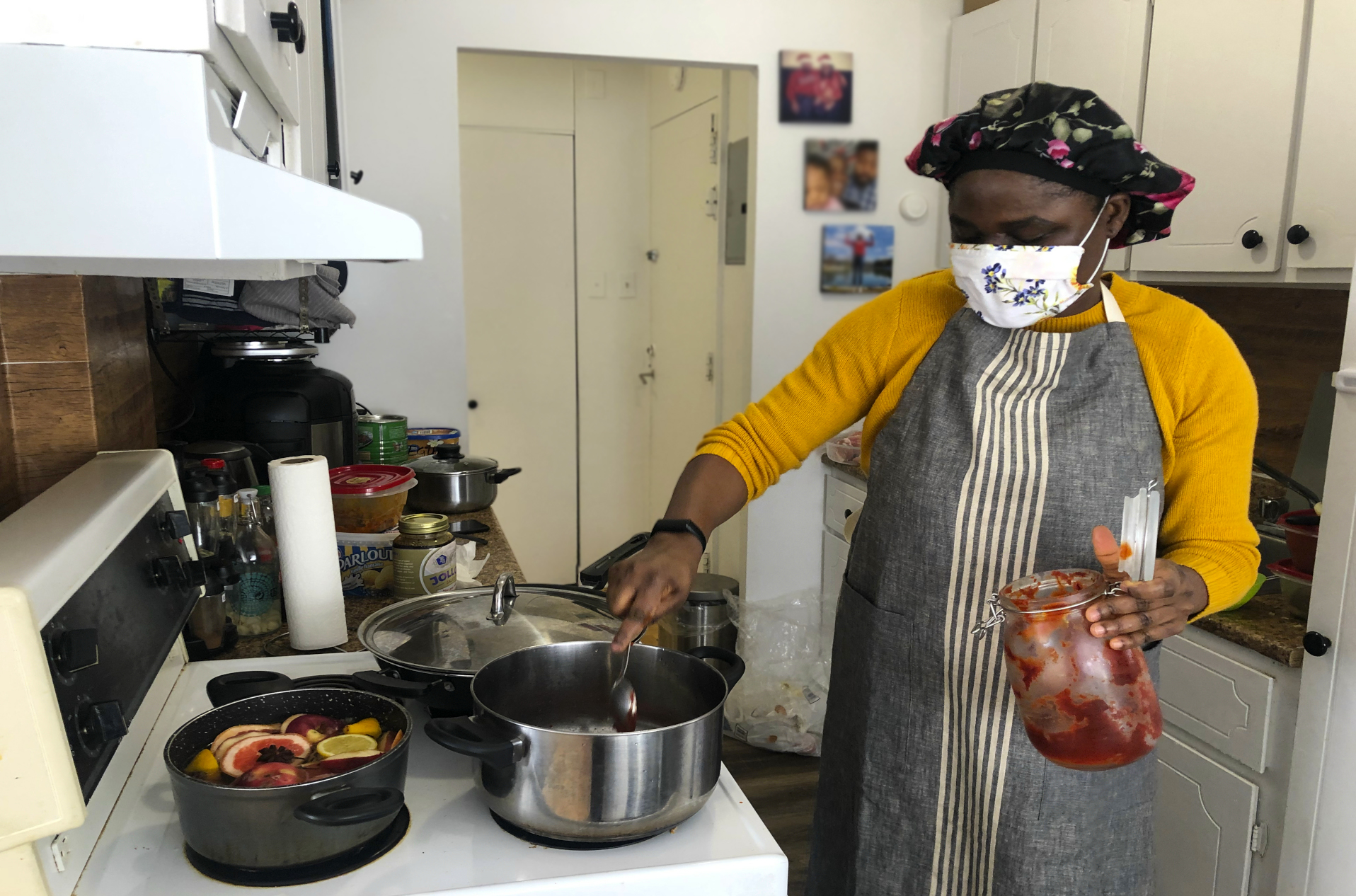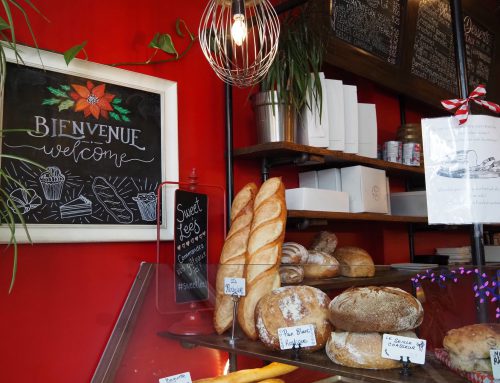BY Maya Amoah & Alec Brideau
Oyeyemi Oshadipe bustles around in the kitchen, concocting her Agobo stew and expertly slicing plantain that’s thrown into a pan of sizzling hot oil moments later. Watching her, you would assume cooking is second nature to her. But that is not the case.
“Growing up with my grandma, she’d do all the cooking herself. I wasn’t allowed to do anything besides stay in the kitchen and the only thing she would let me do was wash vegetables and rinse peppers. But I’d watch. Every time she’d add spices I’d be watching her add in this and that.”
Even through her young adult years, Oshadipe wasn’t much of a cook.
“But when I got married, it changed the game,” she laughs.
Now, she makes all kinds of meals for her food business. Plates of stews, jollof rice, peppered snails and roasted chicken adorn the grid of her Instagram. Most of the dishes are Nigerian. Having moved to Montreal from Nigeria only three years ago, she missed food from home and when she tried a plate from a local restaurant, it just wasn’t the same.
“I wasn’t satisfied,” she says.
Once the pandemic hit, a co-worker who had tasted her food insisted she start something. “He said that he would tell his two friends and that same day I was preparing meal orders for all three of them.”
She realized that single African men were looking for prepared food they could quickly heat up and enjoy. “Meals that were peppery with African spices,” she explains.
Being temporarily off work from her customer service job at Ikea and with her daughter doing online learning from home, she decided to give it a shot.
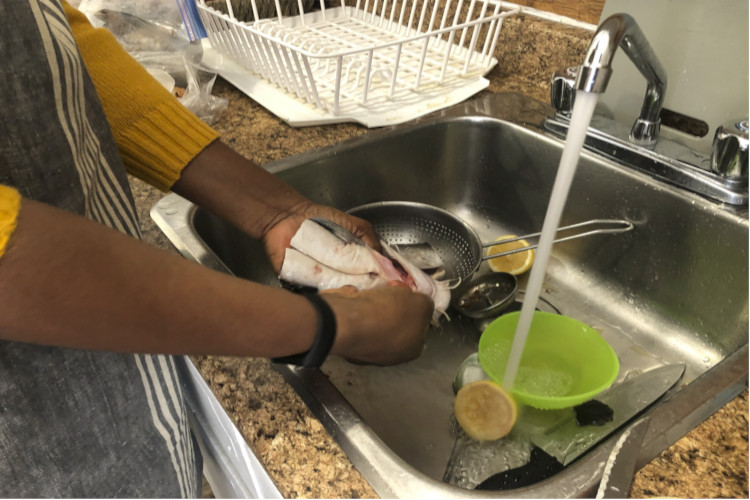
Oyeyemi Oshadipe washes catfish before adding it to her Nigerian pepper soup. Photo by Maya Amoah.
Oshadipe’s food business is one of hundreds in Quebec serving out of home kitchens. A quick search online and you will find food listings galore—plastic containers of chicken biryani, large tin trays of Cajun-spiced seafood along cobs of corn, Chilean empanadas, sushi… the list goes on.
Some businesses are meeting a lot of success. Last year, Mohsen Daknema started selling Persian dishes to friends and family, which quickly spread by word of mouth and social media. He’d put up paid ads on Facebook showing off his dishes.
“We found that posting in small, niche community groups really helped because there were only 2,000 to 4,000 members in a group, so our posts actually stay on the page.”
After such a positive response, he officially launched a catering company in December, moving into an industrial kitchen. His company is now receiving about 100 orders per week. “We haven’t hired anyone yet due to the pandemic, so it’s really nice to be with family cooking together in the kitchen.”
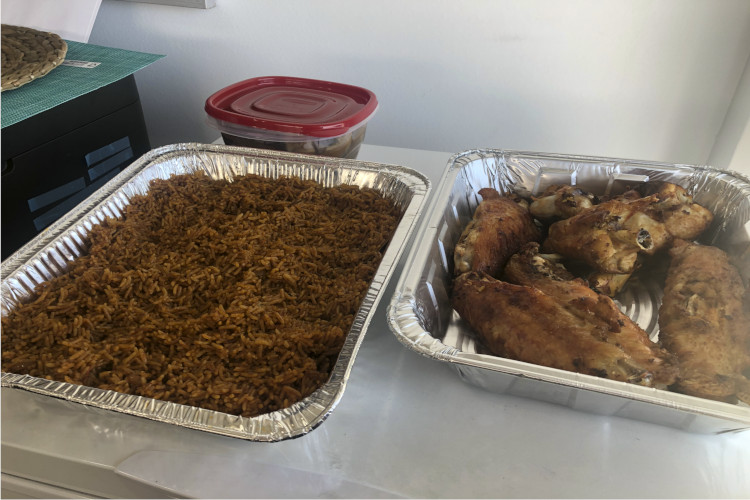
Meals are packed in large aluminum trays for delivery or pick up. Photo by Maya Amoah.
With restaurants closed and many working from home, people have an appetite for something conveniently delivered to their door. According to recent research from Agri-Foods Analytics Lab at Dalhousie University, more than 63 per cent of Canadians ordered food online in the last six months.
While food delivery apps have undoubtedly been wildly successful this year, some people opt for Facebook Marketplace as they are often a more affordable option compared to the additional fees that are calculated at checkout on apps like Ubereats.
But the elephant in the room is food safety. While it may not look like it from the prevalence of ads and social media accounts, these kinds of business practices are technically not legal. Any food sold to the public must be prepared in a certified licensed kitchen.
“If you are preparing and serving food to the public then you have a role in public health,” says Laura Lee Therrien, a food safety educator of Canadian Food Safety Training. “What is the ultimate purpose of eating food? We primarily eat to sustain our lives and give us energy — food safety is of extreme importance.”
Typical home kitchens often do not meet the specific structural requirements, such as separate hand washing sinks, among other things. That leaves aspiring businesses with two legal options: rent an industrial kitchen space or open a brick and mortar. But many choose to take the risk, especially in the face of the current reality that amid the backlog of duties during the pandemic, the shutdown of home kitchens is not the first priority on public health’s radar right now.
As home-based food businesses on Facebook Marketplace surge in popularity, is a strict crackdown imminent? Video by Alec Brideau.
COOK Alliance sees things differently. The California non-profit has been advocating for home-based food businesses since 2014 and they want to see less red tape. Policy and implementation director Peter Ruddock says people should be allowed to give home business a try.
“There are really no easy ways to incubate yourself at the moment so people decide to do it in their own homes, with or without a permit and take some risks,” he says. “There are approximately 100,000 unpermitted home cooks in California with not enough commercial kitchen space. So if they’re doing it anyway, why not make it more safe through education and certification?”
Ruddock says the size of an establishment is an important factor to consider when it comes to food inspection policy. In-home dining experience where the kitchen is in view often has more easily controlled variables as opposed to a large-scale chain restaurant that may be understaffed and underpaid. Food may be left improperly attended to or outsourced from other facilities in questionable conditions.
“If we can acknowledge that food is a living thing and there problems beyond inspection and our goal is to minimize food safety concerns, not make it zero because zero is an unattainable number, then we have a basis on how we can make this as safe as possible,” he says.
Sliding through photos on the COOK Alliance website of dinner guests sitting together in neighbourhood homes and sharing a meal, you get a glimpse into what a more community-oriented food business future could look like. But would it ever be possible?
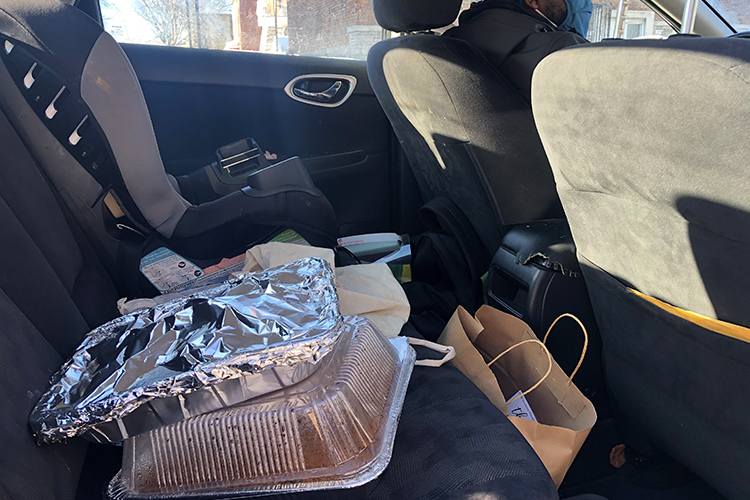
Prepared food is delivered by Oyeyemi’s husband to the customer’s home. Photo by Maya Amoah.
In January 2021, the Ontario government relaxed restrictions as a means to support entrepreneurs during the pandemic. They definitely did not make it legal to sell items like homemade butter chicken but low-risk foods where bacteria is a lot less likely to grow, such as baked goods, chocolates, candies and conserves are now permitted.
Orders are growing for Oyeyemi while she balances her remote day job at Ikea. She chuckles at the prospect of it becoming any more serious in the future.
“In the long run, I’d consider it maybe if I had more hands. But honestly, cooking is hard work!”
What is your experience ordering from home-based businesses? Quiz by Maya Amoah.
